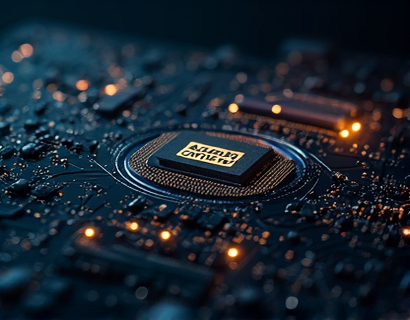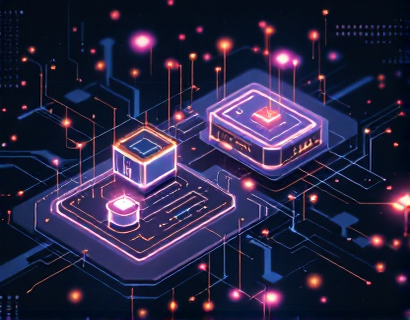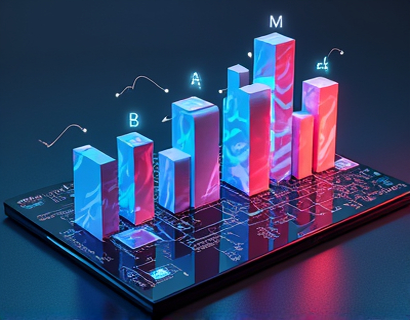Blockchain Oracle Management: Streamlining Data Integration and Smart Contract Execution for Decentralized Applications
In the rapidly evolving landscape of blockchain technology, the integration of reliable data sources and the seamless execution of smart contracts are pivotal for the success of decentralized applications (dApps). Oracle management plays a crucial role in this ecosystem by providing a bridge between the blockchain and external data sources. This article delves into the intricacies of blockchain oracle management, focusing on how advanced solutions can streamline data integration and enhance smart contract functionality, ultimately optimizing blockchain applications for maximum efficiency and security.
Understanding Blockchain Oracles
Blockchain oracles are intermediary services that fetch and provide external data to smart contracts on a blockchain. These data sources can range from simple temperature readings to complex financial data, enabling smart contracts to interact with the real world. The primary function of an oracle is to ensure that smart contracts have access to accurate and timely data, which is essential for their correct execution. However, the role of oracles extends beyond mere data provision; they also play a critical role in enhancing the interoperability and reliability of decentralized systems.
The Challenges of Traditional Oracle Solutions
Traditional oracle solutions often face several challenges that can undermine the effectiveness of blockchain applications. One major issue is the centralization of data sources, which can introduce single points of failure and security vulnerabilities. Centralized oracles are susceptible to manipulation and censorship, compromising the trust and integrity of the blockchain ecosystem. Additionally, the latency and reliability of data fetching can be problematic, leading to delayed smart contract executions and potential discrepancies in data accuracy.
Advanced Oracle Management Solutions
To address these challenges, advanced oracle management solutions have emerged, offering a more robust and decentralized approach. These solutions focus on creating a network of trustless and verifiable data sources, ensuring that smart contracts receive accurate and timely information without relying on a single point of failure. By leveraging decentralized networks, these solutions enhance the security and reliability of data integration, making them ideal for complex and critical blockchain applications.
Decentralized Oracle Networks
Decentralized oracle networks are designed to aggregate data from multiple independent sources, reducing the risk of manipulation and increasing data reliability. These networks use cryptographic techniques to verify the authenticity and consistency of data before it is fed into smart contracts. By distributing the data fetching and validation process across a network of nodes, decentralized oracles minimize the risk of censorship and ensure high availability.
One key feature of decentralized oracle networks is their ability to provide multi-source data aggregation. This means that smart contracts can access data from multiple independent sources, allowing for cross-verification and enhancing the overall accuracy of the information. For instance, a decentralized weather oracle might collect temperature data from multiple weather stations before providing the average reading to a smart contract, ensuring that the data is both accurate and reliable.
Enhancing Smart Contract Execution
Advanced oracle management solutions not only improve data integration but also optimize smart contract execution. By providing timely and accurate data, these solutions enable smart contracts to make informed decisions in real-time. This is particularly crucial for applications that require immediate responses, such as decentralized finance (DeFi) protocols, where price feeds and market data are essential for automated trading and lending processes.
Moreover, advanced oracle management platforms often include features that enhance the efficiency of smart contract execution. For example, they can implement batch processing of data requests, reducing the number of network calls and lowering transaction costs. Some solutions also offer predictive data models, allowing smart contracts to anticipate future data trends and adjust their behavior proactively.
Security Considerations in Oracle Management
Security is a paramount concern in blockchain oracle management. Given the critical role oracles play in feeding data to smart contracts, any vulnerability can have severe consequences, including financial losses and loss of trust in the blockchain ecosystem. Advanced oracle management solutions address these concerns through a combination of cryptographic techniques, decentralized verification, and robust access controls.
Cryptographic techniques such as zero-knowledge proofs and homomorphic encryption ensure that data remains secure and private during transmission and processing. These methods allow oracles to prove the validity of data without revealing the actual data, maintaining user privacy and data integrity. Additionally, decentralized verification mechanisms ensure that data sources are trustworthy and have not been compromised, further enhancing the security of the oracle network.
Access controls are another critical aspect of secure oracle management. By implementing role-based access controls and permissioned networks, these solutions prevent unauthorized access to the oracle network and ensure that only verified and reliable data sources are integrated. This multi-layered security approach helps to mitigate the risks associated with centralized oracles and builds confidence in the decentralized ecosystem.
Use Cases and Applications
The benefits of advanced oracle management extend across various industries and applications, making it a versatile and essential component of blockchain technology. Here are some key use cases that highlight the potential of oracle management solutions:
- Decentralized Finance (DeFi): In DeFi protocols, accurate and timely price feeds are crucial for automated trading, lending, and borrowing. Advanced oracle management solutions provide reliable price data from multiple sources, enabling fair and efficient market operations.
- Supply Chain Management: Blockchain-based supply chain solutions can leverage oracles to track and verify the movement of goods in real-time. This ensures transparency and traceability, reducing the risk of fraud and enhancing trust among stakeholders.
- Internet of Things (IoT): IoT devices generate vast amounts of data that can be integrated into blockchain applications for various use cases, such as smart homes and industrial automation. Oracle management solutions can securely and efficiently fetch data from IoT devices, enabling seamless integration and smart contract execution.
- Voting Systems: Secure and transparent voting systems can utilize oracles to verify and tally votes in real-time, ensuring the integrity and accuracy of election results. Decentralized oracle networks can aggregate data from multiple voting stations, providing a tamper-proof record of the vote count.
These use cases demonstrate the versatility and importance of oracle management in creating robust and trustworthy blockchain applications. By ensuring reliable data integration and secure smart contract execution, advanced oracle management solutions pave the way for innovative and impactful decentralized solutions.
Future Trends and Innovations
The field of blockchain oracle management is continuously evolving, with new innovations and trends shaping the future of decentralized applications. One emerging trend is the integration of machine learning and artificial intelligence (AI) into oracle networks. By leveraging AI, oracles can predict data trends, detect anomalies, and improve the accuracy of data feeds. This not only enhances the reliability of smart contracts but also opens up new possibilities for data-driven decision-making in decentralized systems.
Another area of innovation is the development of cross-chain oracle solutions, which enable seamless data integration across different blockchain platforms. As the blockchain ecosystem becomes increasingly fragmented, cross-chain oracles play a vital role in fostering interoperability and creating a more connected decentralized world. These solutions ensure that data can be reliably transferred and utilized across various blockchain networks, enhancing the scalability and versatility of decentralized applications.
Furthermore, the rise of layer 2 solutions and sidechains presents new opportunities for oracle management. By offloading some of the processing and data fetching tasks to these layers, oracle management solutions can operate more efficiently, reducing costs and improving performance. This synergy between layer 1 blockchains and layer 2 solutions is crucial for the widespread adoption of blockchain technology in various industries.
Conclusion
In conclusion, blockchain oracle management is a critical component of building robust and reliable decentralized applications. By addressing the challenges of traditional oracle solutions and embracing advanced management techniques, developers and businesses can unlock the full potential of blockchain technology. Advanced oracle management solutions not only streamline data integration and enhance smart contract functionality but also ensure the security and integrity of the entire ecosystem. As the blockchain landscape continues to evolve, the importance of effective oracle management will only grow, making it an essential focus area for anyone involved in blockchain development and deployment.










































